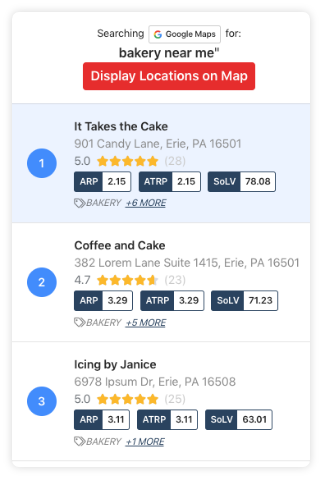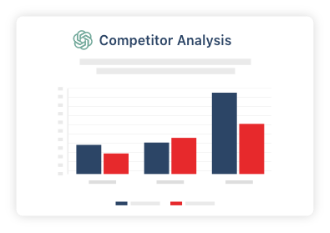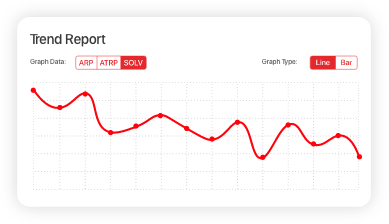
Conducting local competitive analysis focuses on identifying who your top competitors in local search are, as well as why they're ranking high up in the local pack. It's crucial for businesses aiming to optimize their local SEO strategies and maintain a competitive edge.
By understanding the competitive landscape in any local market you're operating in (or thinking about entering), you can make informed decisions to improve and maintain your market position and drive more local business.
Below, we'll go over six specific scenarios when you should perform local SEO competitive analysis to stay ahead of the competition and succeed in local search.
1. When You Want To Identify Your Real Local Competitors
 Identifying your real local competitors is an essential first step in developing an effective local SEO strategy.
Identifying your real local competitors is an essential first step in developing an effective local SEO strategy.
Many businesses have an idea of who their top competitors are, but this often doesn't align with who is actually ranking highest in local search results.
It's important to understand that your true competitors are not just those offering similar products or services in your area, but also those who are vying for the same local search visibility, especially in Google Search and Google Maps.
For example, there might be a restaurant down the street from your sandwich shop that also sells sandwiches, but they're not truly competing with your business because they aren't performing well in local search. Sure, they might compete for some of the foot traffic in the neighborhood, but they aren't capturing a significant share of your target audience who are searching online for sandwich shops to visit on their lunch breaks.
By conducting thorough local competitive analysis, you can discover which businesses consistently appear in local search results for your target keywords and geographic area. This helps you recognize not only direct competitors, but also indirect ones who might be capturing your potential customers' attention unbeknownst to you (until now).
Understanding who your real local competitors are allows you to tailor your local search optimization strategies more effectively, focusing on areas where you can gain an advantage and identifying gaps in the market that you can exploit. This insight ensures that your efforts are targeted and strategic, maximizing your chances of improving your local search rankings and attracting more customers.
2. When You're Considering Entering a New Market
Entering a new market requires gaining a thorough understanding of the existing competitive landscape, which is done through a process called gathering market intelligence.
Knowing who the key players are, their strengths and weaknesses, and the overall market demand will help you develop a strategy that leverages your unique strengths and fills gaps in the market.
By analyzing local competitors, you can identify what they are doing well and where there are opportunities for you to differentiate your business. This analysis helps you understand the local customer base and their preferences, the types of services or products that are in demand, and the local search marketing strategies that are most effective.
Without this knowledge, you risk entering the market blindly, potentially investing in strategies that do not resonate with the local audience or wasting resources trying to outrank established, high-performing businesses that are very difficult to dethrone from the top of local search results.
3. When New Competitors Enter Your Market
New entrants to your target area can disrupt existing market dynamics and potentially take away some of your market share, so it's vital to quickly assess their strategies and adapt to stay competitive. Understanding new competitors' approaches helps you anticipate market changes and adjust your local SEO tactics accordingly.
When new businesses enter your market, they might bring fresh ideas and innovative approaches that could appeal to your target audience. By performing local competitive analysis, you can quickly identify these new tactics and determine how to counteract them. This proactive approach ensures that you can maintain your market position and even find new opportunities to improve your offerings based on the strategies of new entrants.
4. When You're Implementing a Local SEO Strategy for the First Time
 When you're implementing a local SEO strategy for the first time, including when you're overhauling an existing strategy, understanding how your competitors are performing in local search results in real time is essential. This data helps you identify opportunities and gaps in your own strategy.
When you're implementing a local SEO strategy for the first time, including when you're overhauling an existing strategy, understanding how your competitors are performing in local search results in real time is essential. This data helps you identify opportunities and gaps in your own strategy.
For instance, analyzing competitors can reveal which keywords they are successfully targeting, how they structure their Google Business Profiles, and the types of content that drive engagement. This information is invaluable as it provides a benchmark for your own efforts.
Without this local competitive analysis, you might miss out on critical opportunities to optimize your new local SEO strategy, leading to suboptimal performance and slower growth in local search rankings.
5. When You Experience a Decline in Sales or Traffic
A sudden drop in sales or website traffic could indicate that competitors are gaining an edge in local search. Analyzing their activities and performance can help you identify what changes they've made and how you can counteract them.
For example, if competitors have updated their Google Business Profiles with new categories or features, improved their Google Reviews, or launched new promotional campaigns, these actions could be drawing customers away from your business.
By understanding these changes, you can adjust your strategies to address the decline, whether that involves optimizing your Google Business Profile, getting more positive reviews, or launching targeted marketing campaigns to regain customer attention and generate more leads (using Google LSAs, for example).
In short, local SEO competitive analysis helps you respond quickly and effectively to market shifts, minimizing their impact on your business.
6. When Monitoring the Effect of Ongoing Local Search Optimizations
 Regularly assessing the effectiveness of your local SEO efforts is necessary to ensure that your strategies are working and to make adjustments as needed. Continuously monitoring competitors is an important part of this, as it helps you stay aware of any changes they make that could affect your local search performance.
Regularly assessing the effectiveness of your local SEO efforts is necessary to ensure that your strategies are working and to make adjustments as needed. Continuously monitoring competitors is an important part of this, as it helps you stay aware of any changes they make that could affect your local search performance.
By keeping an eye on your competitors' local search rankings over time, updates to their Google Business Profiles, and customer reviews, you can gauge the success of your own optimizations. This continuous monitoring allows you to refine your strategies based on real-time data, ensuring that you remain competitive in the local search landscape.
Without this ongoing local competitive analysis, you might miss out on important trends and changes in the market that could impact your visibility and success.
Wrapping Up
By conducting local competitive analysis in all the scenarios above, you can effectively use local competitor insights to inform your local SEO strategies and maintain a strong presence in your target markets.
Regularly analyzing your competitors helps you stay ahead of market trends, identify new opportunities, and continuously improve your local search performance. This proactive approach ensures that you can adapt to changes quickly, capitalize on emerging opportunities, and maintain a competitive edge in the hyper-competitive local search market.
Local Falcon offers users a range of features tailored for local SEO competitive analysis, including AI-generated analysis and optimization recommendations for rank tracking scans, dedicated Competitor Reports, AI Reviews Analysis, and more. Try it today!


